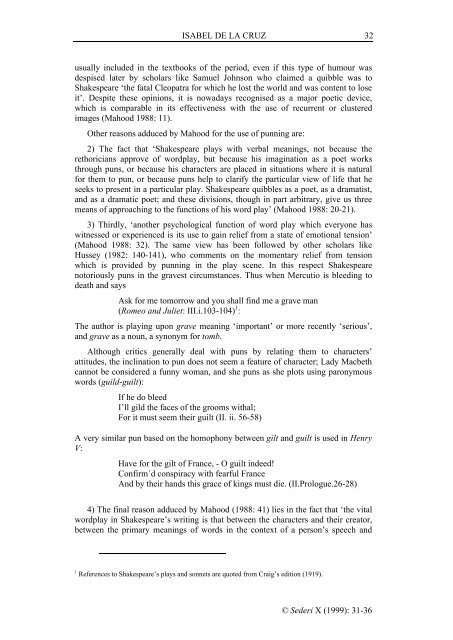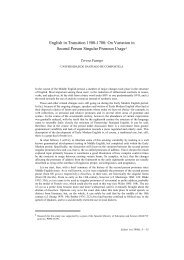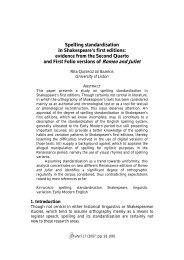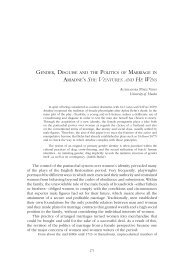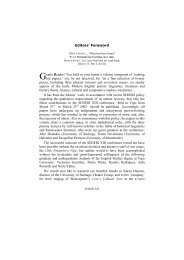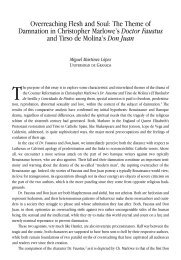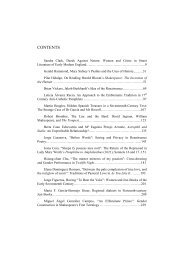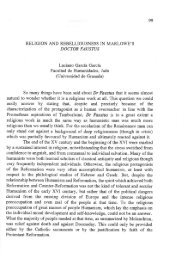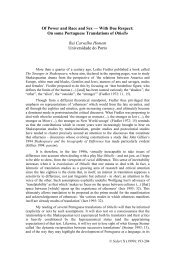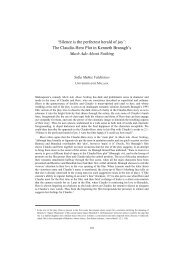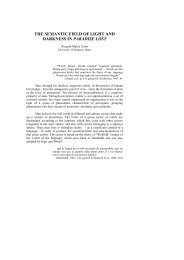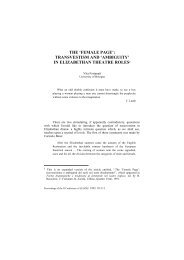Lexical Ambiguity and Wordplay in Shakespeare - SEDERI
Lexical Ambiguity and Wordplay in Shakespeare - SEDERI
Lexical Ambiguity and Wordplay in Shakespeare - SEDERI
You also want an ePaper? Increase the reach of your titles
YUMPU automatically turns print PDFs into web optimized ePapers that Google loves.
ISABEL DE LA CRUZ 32<br />
usually <strong>in</strong>cluded <strong>in</strong> the textbooks of the period, even if this type of humour was<br />
despised later by scholars like Samuel Johnson who claimed a quibble was to<br />
<strong>Shakespeare</strong> ‘the fatal Cleopatra for which he lost the world <strong>and</strong> was content to lose<br />
it’. Despite these op<strong>in</strong>ions, it is nowadays recognised as a major poetic device,<br />
which is comparable <strong>in</strong> its effectiveness with the use of recurrent or clustered<br />
images (Mahood 1988: 11).<br />
Other reasons adduced by Mahood for the use of punn<strong>in</strong>g are:<br />
2) The fact that ‘<strong>Shakespeare</strong> plays with verbal mean<strong>in</strong>gs, not because the<br />
rethoricians approve of wordplay, but because his imag<strong>in</strong>ation as a poet works<br />
through puns, or because his characters are placed <strong>in</strong> situations where it is natural<br />
for them to pun, or because puns help to clarify the particular view of life that he<br />
seeks to present <strong>in</strong> a particular play. <strong>Shakespeare</strong> quibbles as a poet, as a dramatist,<br />
<strong>and</strong> as a dramatic poet; <strong>and</strong> these divisions, though <strong>in</strong> part arbitrary, give us three<br />
means of approach<strong>in</strong>g to the functions of his word play’ (Mahood 1988: 20-21).<br />
3) Thirdly, ‘another psychological function of word play which everyone has<br />
witnessed or experienced is its use to ga<strong>in</strong> relief from a state of emotional tension’<br />
(Mahood 1988: 32). The same view has been followed by other scholars like<br />
Hussey (1982: 140-141), who comments on the momentary relief from tension<br />
which is provided by punn<strong>in</strong>g <strong>in</strong> the play scene. In this respect <strong>Shakespeare</strong><br />
notoriously puns <strong>in</strong> the gravest circumstances. Thus when Mercutio is bleed<strong>in</strong>g to<br />
death <strong>and</strong> says<br />
Ask for me tomorrow <strong>and</strong> you shall f<strong>in</strong>d me a grave man<br />
(Romeo <strong>and</strong> Juliet: III.i.103-104) 1 :<br />
The author is play<strong>in</strong>g upon grave mean<strong>in</strong>g ‘important’ or more recently ‘serious’,<br />
<strong>and</strong> grave as a noun, a synonym for tomb.<br />
Although critics generally deal with puns by relat<strong>in</strong>g them to characters’<br />
attitudes, the <strong>in</strong>cl<strong>in</strong>ation to pun does not seem a feature of character; Lady Macbeth<br />
cannot be considered a funny woman, <strong>and</strong> she puns as she plots us<strong>in</strong>g paronymous<br />
words (guild-guilt):<br />
If he do bleed<br />
I’ll gild the faces of the grooms withal;<br />
For it must seem their guilt (II. ii. 56-58)<br />
A very similar pun based on the homophony between gilt <strong>and</strong> guilt is used <strong>in</strong> Henry<br />
V:<br />
Have for the gilt of France, - O guilt <strong>in</strong>deed!<br />
Confirm´d conspiracy with fearful France<br />
And by their h<strong>and</strong>s this grace of k<strong>in</strong>gs must die. (II.Prologue.26-28)<br />
4) The f<strong>in</strong>al reason adduced by Mahood (1988: 41) lies <strong>in</strong> the fact that ‘the vital<br />
wordplay <strong>in</strong> <strong>Shakespeare</strong>’s writ<strong>in</strong>g is that between the characters <strong>and</strong> their creator,<br />
between the primary mean<strong>in</strong>gs of words <strong>in</strong> the context of a person’s speech <strong>and</strong><br />
1 References to <strong>Shakespeare</strong>’s plays <strong>and</strong> sonnets are quoted from Craig’s edition (1919).<br />
© Sederi X (1999): 31-36


